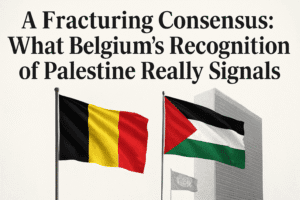A Fracturing Consensus: What Belgium’s Recognition of Palestine Really Signals
Belgium’s decision to recognize Palestinian statehood at the UN, alongside key allies like France and Canada, signals a critical rupture in the long-standing Western consensus on the Israeli-Palestinian conflict. This move transcends symbolism, as it is coupled with tangible sanctions targeting Israeli settlement economies, representing a new European willingness to apply concrete pressure. It highlights a growing transatlantic divide, with the U.S. and Israel becoming increasingly isolated as traditional allies pursue independent foreign policies.
This shift provides the Palestinian Authority with significant diplomatic leverage, strengthening its quest for legitimacy on the global stage. However, it does not solve the Authority’s internal governance challenges or the daily realities of occupation. Conversely, the move risks provoking a hardline Israeli response, such as accelerated annexation, further entrenching the conflict. Ultimately, this marks a fundamental rerouting of the peace process, moving it away from stalled direct talks and into the arena of international diplomacy and economic statecraft.

A Fracturing Consensus: What Belgium’s Recognition of Palestine Really Signals
In the hallowed halls of the United Nations, a nation’s flag is more than just cloth and dye; it is a potent symbol of legitimacy, sovereignty, and a seat at the table of global politics. This September, when the flag of Palestine is raised higher on the international stage, it will be bolstered by a new and significant hand: that of Belgium.
This move is far more than a procedural formality. Belgium’s pledge to formally recognize Palestinian statehood at the UN General Assembly, accompanied by a slate of 12 targeted sanctions against Israel, marks a critical inflection point. It’s a clear signal that the decades-old Western consensus on the Israeli-Palestinian conflict is not just shifting—it is fundamentally breaking apart.
Beyond Symbolism: The Weight of Concrete Action
While over 140 UN member states already recognize Palestine, Belgium’s decision carries outsized weight because of the company it keeps and the actions it promises. By aligning with fellow European powers like France, and other key U.S. allies such as Canada, Australia, and the UK, Belgium is part of a coordinated diplomatic wave.
However, what truly separates this from mere symbolic gesture is the accompanying sanctions package. This isn’t just a statement of principle; it’s a policy with teeth:
- An import ban on goods from Israeli settlements, directly targeting an enterprise most of the world considers illegal under international law.
- A review of public procurement contracts with Israeli companies, threatening a tangible economic cost.
- Travel bans on figures associated with Hamas, demonstrating a targeted approach that aims to pressure the Israeli government without absolving Palestinian militant groups.
These measures are a direct response to the humanitarian crisis in Gaza, continued settlement expansion in the West Bank, and alleged violations of international law. They represent a European conviction that diplomatic patience has run its course and that tangible pressure is now necessary.
The Great Rupture: A Transatlantic Divide
Perhaps the most profound implication of this move is the chasm it reveals between the United States and its traditional European allies. As the U.S. administration reportedly works to block Palestinian President Mahmoud Abbas from even attending the same UN summit, key NATO partners are preparing to hand his administration a significant diplomatic victory.
This creates a stark new reality:
- The U.S. and Israel are growing increasingly isolated on the world stage on this issue. The traditional automatic support bloc is eroding.
- The European Union is struggling to maintain a unified foreign policy. With members like Germany likely to remain more cautious and Hungary staunchly pro-Israel, the EU’s internal divisions will only deepen, potentially weakening its collective clout.
- Nations are pursuing independent Middle East policies, based on their own national interests and public opinion, rather than falling in line behind a superpower’s agenda.
The Human Element: Leverage, Not a Solution
For the Palestinian Authority, this recognition is a monumental diplomatic achievement. It provides crucial leverage and reaffirms its statehood quest on the global stage. However, it is not a silver bullet. The PA still grapples with severe internal challenges, including legitimacy issues at home, a divided governance structure with Hamas in Gaza, and the ongoing daily realities of occupation. Recognition at the UN does not automatically translate into freedom of movement, economic prosperity, or security for the average Palestinian.
Conversely, the Israeli government is likely to perceive this not as pressure for peace, but as an unfair punitive measure that rewards Palestinian leadership without requiring concessions. The fear among many analysts is that this could push Israel’s leadership toward more hardline positions, such as accelerating de facto annexation of parts of the West Bank in retaliation, further entrenching the conflict.
The Path Forward: A New World Order
Belgium’s decision is a symptom of a larger global trend: the decay of the post-WWII world order and the move toward a more multipolar, fragmented international landscape. Middle East policy is no longer dictated from Washington alone.
The genuine insight here is that the journey to a two-state solution—or any sustainable peace—is being radically rerouted. It is no longer solely dependent on direct, U.S.-brokered talks between Israelis and Palestinians, which have been moribund for years. Instead, it is being shaped in European capitals, at the United Nations, and through economic policy.
The raising of a flag is a moment of theatre, but the sanctions and the shifting alliances are the real plot. They tell a story of frustration, changing priorities, and a desperate search for new tools to solve an old conflict, even if it means walking alone.
You must be logged in to post a comment.